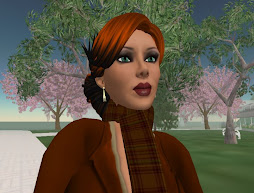One of the questions that came up was, how does virtual support compare with real life support. The speakers made some important points, emphasizing the discoverability and accessibility of the SL support group and the low threshold for joining it.
Five different perspectives, from survivors in the USA, Canada, and Brazil, with different types of cancer, but with several common themes.

From left to right: Hilde, Les, Poppy (standing), Dwen, Tathi and Cinders
Hilde Hullabaloo, a thyroid cancer survivor in Canada, says she was never offered any support in real life. 'My doctors appeared to have no idea there is support out there for thyroid cancer patients, or didn't judge me in need of it. I was explicitly told to stay off the internet when it comes to thyroid cancer, because it would scare me.
'I don't drive and live in a very car-dependent area; there was no way I would have made it to a “real world” support group meeting, particularly not while I was tired and in pain. In the throes of treatment, I felt ashamed, depressed, and terrified; I found it difficult to express those feelings to anyone in the real world.
'The threshold for entering into SL's support group, while higher in terms of technology and bandwidth, was emotionally and physically lower.'
Les Karsin, a prostate cancer survivor in the USA, pointed out that one important difference between RL and SL support groups was accessibility. 'In SL it is much easier to find a group and easier to attend meetings than it would be for me in RL. All I had to do was search groups for the word "cancer," and the ACS survivors' group was right there. To attend meetings, all I have to do is sit down at my computer, log in, and TP to the meeting location.'
Les also prefers the relative anonymity provided by SL. '... [it] made it feel safer for me to attend the first few meetings. I am actually quite a shy person, and it would have been much harder for me to walk into a room full of people in RL for the first time and tell my story. On the other hand, now that I have experienced the benefits of a support group in SL, perhaps I will be more likely to seek out a group in RL at some point in the future.'
He has found e-mail based support groups helpful, but points out that '... meeting with a group in SL, in a virtual environment where I can see other people's avatars seated around me and interact with them in real-time, gives me a much stronger sense of presence and connection ...so, I think that SL provides many of the same benefits as meeting with a group in RL, but reduces some of the barriers that make it hard for a person like me to take that first step of joining a group. Another advantage of SL is that I get to meet and talk with people from all over the world, not just my local area. That gives me a sense that I am part of a much larger, global community of people who are fighting this disease.'
Dwen Dooley agrees. 'Anonymity, via an avatar that has ... or doesn't have to have ... a connection to your real name, can give you courage. You can talk about "private" matters in SL where you might feel there was a taboo about talking about it in "Real Life".
'Access can be another issue. SL offers desk or lap-top access to support without concern for travel, ramps, stairs, hills, cars, buses, trains ... the outdoors ... those limited by their RL bodies are mostly not as constrained by SL.
'In SL you can't hold a real hand, cry on a real shoulder, or get a "real" hug. [But] those who immerse themselves in SL are used to its limitations and accept them because they've seen such amazing benefits despite those limitations.'
Tathi Pessoa, a cancer survivor from Brazil, says: 'I’ve never been to a RL support group, its not usual in Brazil . I’m not aware of groups outside the big cancer hospitals and when I have to go to a cancer center usually I have to stay face to face with people in all kinds of state of cancer (normally very advanced ). It scares me a lot so I avoid this kind of places. SL can provide beautiful places and environments ... different from the scary one.'
Cinders Vale is a six-year breast cancer survivor in the USA. She had to give up her car several years ago and finds getting to real life support meetings, especially in the winter, is a problem.
She says: 'I think going to virtual meetings/chats for many is easier. It doesn't matter how bad you look or feel. You are still surrounded by those who have been where you are, and who understand. You can feel the support and caring. Survivors or caregivers who need to talk at any time of the day or night have access to group members. They can just open up the group IM window and see who answers them. Our virtual support system works just as well as any RL version. It does fulfil a need for many out there.'
Many thanks to all the participants for sharing their perspectives.


1 comment:
Thanks to all for sharing, and for Poppy to put it up.
I am quite interested in folk's feelings about virtual worlds Vs simple chat, forums, or email, so it was great to hear Les Karsin address it. I would really like to see this explored more deeply.
Thanks to all!
Post a Comment